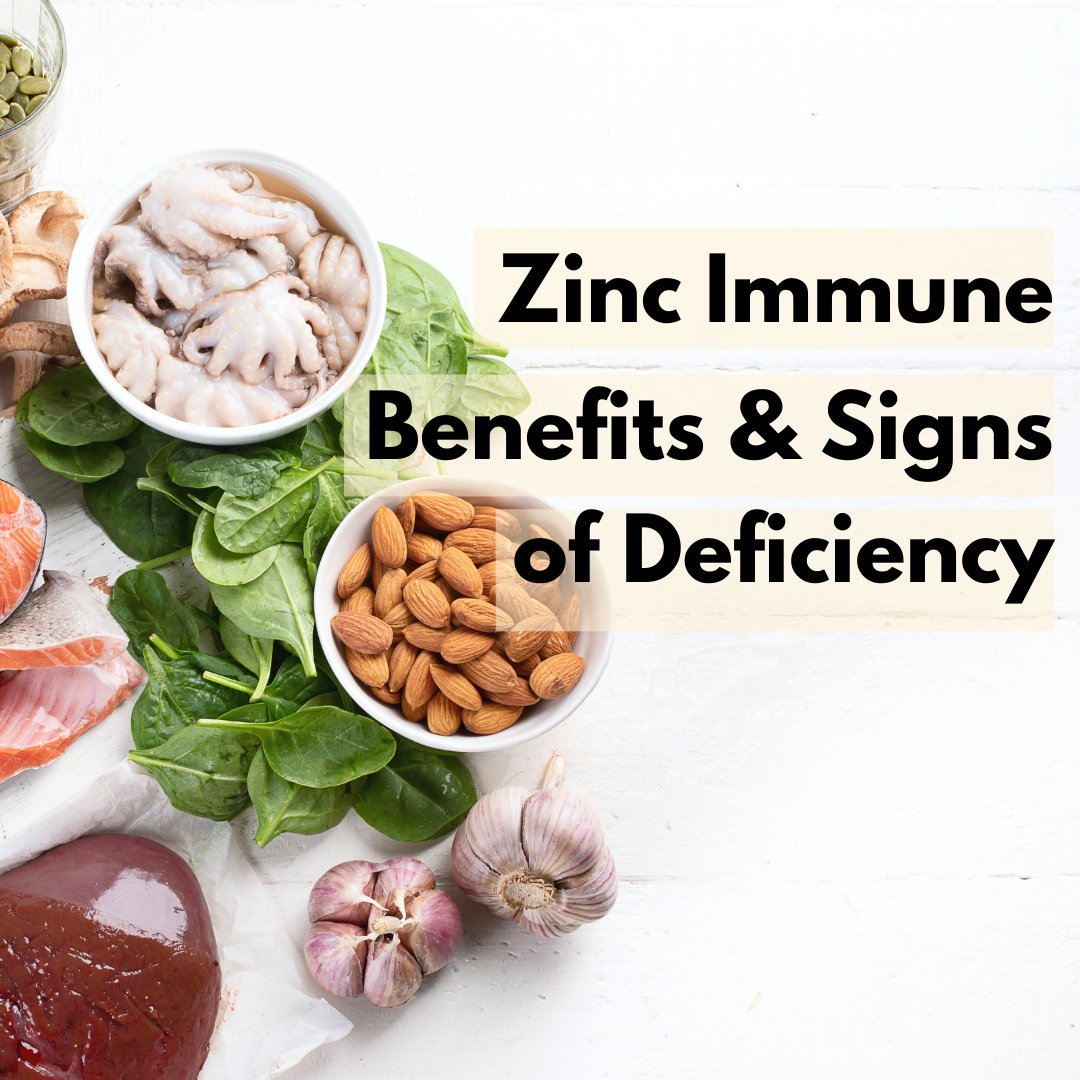Zinc: Immune Benefits and Signs of Deficiency

As the second-most abundant trace mineral in your body, zinc is a supplement that is vital to the immune system and has many benefits. Individuals can most often get their daily intake of zinc through foods in their diet, but there are cases in which taking a zinc supplement is beneficial.
Zinc plays a role in the activity of over 300 enzymes that assist with functions of the body including digestion, metabolism, nerve function and brain health. There are several benefits to zinc and the body’s functions.
Benefits of Zinc
Zinc and the Immune System
Zinc plays a vital role in the development and function of cells.1 A deficiency in this mineral can lead to a weakened immune response. One of the most common uses for zinc supplements is to help combat the common cold. Studies show that supplementing 80-92 mg per day of zinc may help reduce the length of the common cold by up to 33%.2

To help reduce the severity and length of a cold, it is recommended to take zinc supplements at the onset of your symptoms. Studies also show that taking a combination of immune boosting supplements offers an even greater benefit, such as vitamin C and elderberry.
A combination of zinc and Vitamin C together has added benefits for the immune system. According to a study published in the National Institutes of Health (NIH), taking zinc and vitamin c together offers a significant reduction in the length of the cold when compared to taking only one form of immune booster.1 If an individual is suffering from the common cold, taking zinc lozenges with vitamin C can help to reduce the duration by up to 27% than if only taking one or the other.
Zinc Increases Rate of Wound Healing
Zinc is used in the hospital setting when treating wounds such as burns, ulcers and other skin conditions. The mineral is necessary for healing of wounds and skin injuries since it plays a role in immune function, collagen synthesis and inflammatory responses. If an individual has a zinc deficiency, supplementing zinc helps to increase the rate of recovery in those with wounds.2
Helps Reduce Risk of Age-Related Diseases
Since this mineral increases your body’s immune response, it naturally helps to protect the body from infection. In the aging population, this can help reduce the risk for the flu and pneumonia. In fact, a study of zinc’s impact on human health and disease showed that taking 45 mg of zinc per day helps to reduce infection rates in the elderly by 66%.2
Zinc Supplements
While there are many benefits to zinc, there is also a risk of getting too much of this mineral. According to Health.com, some of the effects of having too much zinc include:
- Nausea
- Vomiting
- Loss of appetite
- Abdominal cramps
- Diarrhea
- Headaches
A surplus of zinc can have an adverse effect on the body’s immunity.
It is recommended for adults to take 40 mg of zinc per day. Most supplements are over that amount as they’re intended to be used for short periods of time (e.g. when suffering from a cold). Before taking a zinc supplement for an extended period, or if you suspect you have a zinc deficiency, it is best to consult your doctor or healthcare professional.3
Signs of a Zinc Deficiency
Those with a low zinc often suffer from a weakened immune system which may result in suffering from colds more frequency, as well as feeling fatigue. In addition, there are specific zinc deficiency symptoms that you may be able to physically see.

Losing hair is one of the common symptoms of a zinc deficiency. Since the mineral is necessary for cellular functions for hair, a deficiency in zinc often results in hair loss.
A previous study of individuals who suffered hair loss showed that supplementing zinc daily for 12 weeks led to an improvement for 66% of individuals.
Brittle NailsZinc deficiency also impacts the health of your nails. Some of the common symptoms include white spots on the nails, referred to as Beau’s lines, as well as overall brittle and cracked nails. Since zinc is necessary to the growth of tissue and cells, it can significantly impact nail health.4
Eating a diet rich in zinc or supplementing the mineral if you are deficient can help to improve health of nails.
Mouth Ulcers and Cold SoresFrequent moth ulcers may be a sign of a nutritional deficiency including zinc, iron, folic acid and vitamin B12. Low levels of the mineral increase the risk for oral ulcers and inflammation in and around the mouth.
When to Take Zinc Supplements

The most common use for taking zinc is when suffering from a cold. Supplementing to treat a cold is a short-term use rather than a daily routine. This use for zinc has shown to significantly reduce the length of the common cold, especially when taken in combination with other immune boosters such as Vitamin C.
An Ohio State University study showed that zinc also has anti-inflammatory effects. The mineral is part of a protein that prevents uncontrolled inflammatory response which is seen in conditions such as eczema and psoriasis. Zinc supplements have also shown to help treat herpes infections, including herpes simplex (cold sores), genital herpes and herpes zoster (shingles).5 Zinc can be used as a homeopathic treatment to cold sores and herpes breakouts versus prescription medication.
As highlighted earlier, taking too much zinc can have adverse effects, so it should not be added to your long-term daily routine without first consulting your doctor.
Basic Brands Zinc Supplements
Basic Brands offers several natural zinc supplements. For more information, visit our product section or send a message via our Contact Page.
1 Molecular Medicine
2 Healthline
3 Health.com
4 Healthista
5 Health and Science

